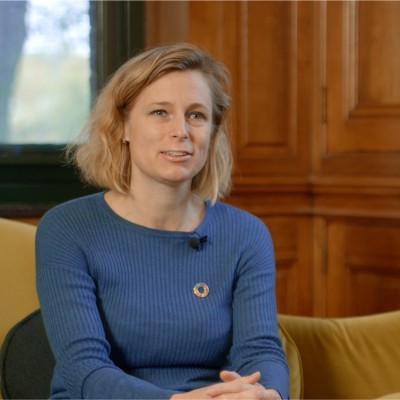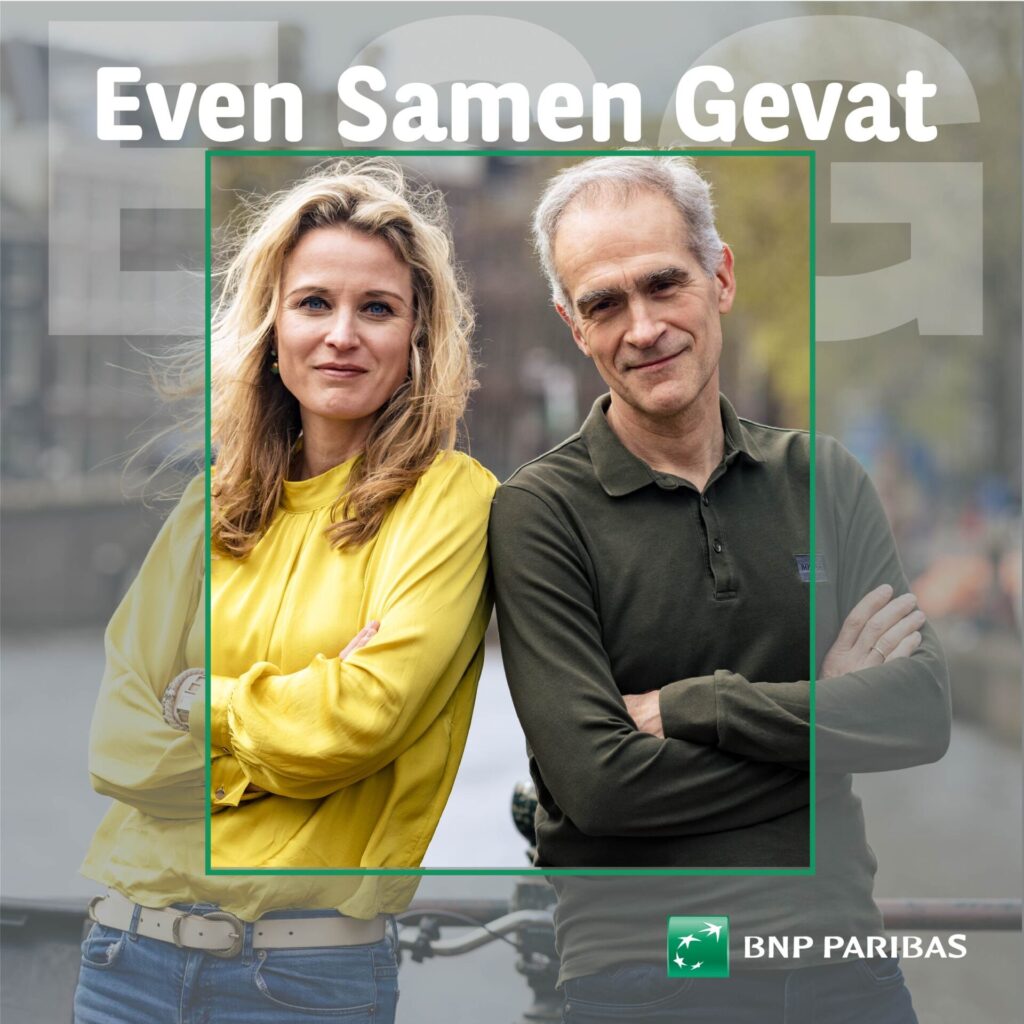Buckling down to the SDGs
In episode 22 of ESG (Even Samen Gevat) Marloes and Aldert speak with Judith Maas, director of SDG Nederland.
Formerly, Judith Maas worked for the Ministry of Foreign Affairs. She was proud to represent our country internationally, but she also saw that we were starting to get behind in areas where we had previously been leading the way. ‘How can we get the Netherlands back in that forefront?’ she wondered, which is why she made the move to SDG Nederland.
What is SDG Nederland?
SDG stands for the 17 sustainable development goals adopted by all countries of the United Nations to make the world a better place. Judith says the SDGs form ‘the most sustainable agenda for 2030 that we’ve all adopted together.’ There are goals for the fight against poverty (SDG 1), for affordable and sustainable energy (SDG 7) and for responsible consumption and production (SDG 12). As a network organisation, SDG Nederland ensures that people and organisations encourage each other to take action and keep each other informed about ways to achieve the SDGs. SDG Nederland is a ‘connector’: it has a special alliance coordinator for each SDG, whose tasks include ensuring ‘that we all use the same words to talk about sustainability.’ In addition, the organisation works with the likes of the Salvation Army (for SDG 1) and Coöperatie Leren voor Morgen, a group of collaborating organisations committed to learning for sustainable development (for SDG 4).

The predecessor of SDG Nederland was established in 2016, and the main goal is set for 2030. This means that we’re halfway there. ‘The first half is finished’, says Judith, ‘we’re starting on the second half. It’s significantly more costly to repair damage, so it’s better to invest now and pay the bill, because it’s all only going to become much more expensive down the road. And the Netherlands along with other Western countries also has a duty to do something, simply because we account for most of the world’s consumption of energy and raw materials, for example.’
Ambitious plans
The question is whether it’s going to work, but Judith is optimistic. A country like Colombia has already made the SDGs the basis of its entire national policy, for instance, and Europe has its Green Deal: ‘Some very ambitious directives are on the way that will determine the future for Dutch business and the financial sector.’ The government and the business community know that too. SDG Nederland is often asked to help companies, local authorities and provinces that want to get cracking on the SDGs. ‘We’re very happy to have a steering committee behind us that represents the big sectors: MVO Nederland (an association for the New Economy), Global Compact and VNO-NCW (Confederation of Netherlands Industry and Employers). And VNG (Association of Dutch Municipalities) is also very active through local governments.’

Companies have a huge responsibility, but the real power rests in the hands of consumers
‘Companies have a huge responsibility, but the real power rests in the hands of consumers.’ Judith cites the example of repair cafés, a citizens’ initiative that promotes the repair of products, and of the Dutch Consumers’ Association, which tests which products are the most sustainable. She argues in favour of buying less (‘Be aware of what you buy. Just buy less, buy second-hand.’) and public transport (‘because even an electric car isn’t sustainable’). We need to say goodbye to ‘that endless pursuit of limitless economic growth, a consumer society based on things.’ Consumers aren’t accepting that any more, according to Judith.
No growth?
The complicated path to achieving the SDGs actually demonstrates the problem with growth. On the one hand, we need to put an end to ‘limitless economic growth’; on the other, SDG 8 is about income, work and economic growth: ‘Developing countries need economic growth in order to achieve their social goals, such as in education and health.’ However, it’s assumed that if these countries grow economically, ‘that will take place in a sustainable way, and the other 16 SDGs will be firmly anchored right away.’
Two convincing indicators
Judith gives two examples to illustrate how wasteful people are, especially in the West. The first is Earth Overshoot Day: ‘a scientific computer model that shows how much biomass, raw materials and energy the earth produces. So it makes great sense not to use up more than one earth per year; but instead we’ve been using up too much of the earth and eating into our natural capital. Western countries do a lot more of that than the Global South. And since the average Overshoot Day is – off the top of my head – around 1 July, that still leaves us with half a year. As a student I also always had a few days left to go after my money was used up.
The other example is the Spillover Index: ‘That’s an index which measures what we in the Netherlands cause to the SDGs through our actions, for example. The Netherlands scores almost the worst of all the countries in the world in that index.’ The Netherlands exports pesticides, for example, which damage the biodiversity in other countries. ‘The financial and economic impact of our policy is measured as well, and then you see that we score poorly for channelling away the profits of multinationals and for tax avoidance. So if you give funds for development aid to Nigeria, for example, but make it possible, via the Netherlands, for companies that operate in Nigeria to avoid paying taxes to Nigeria, you get a negative balance. That means we cause damage.’
Seizing the moment
The Spillover Index comes back every year during the Accounting Day of the Dutch Lower House of Parliament. That’s when the government reports on the SDGs. ‘The national SDG report comes out at the same time, where all sectors of society report on what’s going on and what’s going well and not as well.’ According to that report, there actually is a positive trend: ‘Many more players in society are getting involved in sustainability. But when you start measuring objectively, you see that it’s just not going fast enough. And if the Netherlands can’t make it work, what other country in the world can we ask to do it? This is something we should just be able to accomplish if we all pull together. Now is the time to seize the moment.’
Judith realises that we won’t be finished in 2030. ‘There’ll be a new agenda.’ Maybe we should work more towards true pricing. ‘I was recently at one of the government’s ministries’, she says, ‘and in the canteen I saw not only the price that you pay for a sandwich but also the true price. That’s step one: awareness. We all know what way we need to go. So let’s just pull together and not hinder each other – time to buckle down and get the job done.’
ESG Even Samen Gevat is a podcast series (in Dutch) in which Aldert Veldhuisen and Marloes Bergevoet talk to accelerators of the sustainable transition. They discuss topics related to the “E”, like green energy, CO2 emissions, raw materials, biodiversity, the “S” of health, diversity and inclusiveness and the “G” such as laws and regulations and international cooperation.
Also published in this series are:
- Circular farming in the city – with Peter and Minke van Wingerden
- The energy transition is also geopolitics – with Rob de Wijk
- There is life after growth – with Paul Schenderling
Follow Even Samen Gevat here so you don’t miss an episode!
